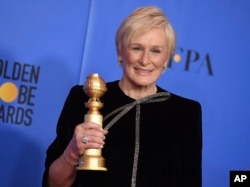It was a series of upsets at the Golden Globes Award ceremony Sunday night in Los Angeles, California.
One of the biggest surprises was the Hollywood Foreign Press Association’s choice for best movie, drama. It chose Bohemian Rhapsody, a film about the life of musician Freddie Mercury, over the heavily favored film, A Star Is Born, a film about imaginary musicians.
A Star Is Born entered the night with several major nominations. It was expected to win at least two. But the film won only a music award for the film’s song, Shallow.
Instead, two of the biggest awards Sunday night went to Bohemian Rhapsody. The movie was hugely popular with the public but received less praise from critics. Rami Malek, who played Mercury, also won the Golden Globe for best actor.
"Thank you to Freddie Mercury for giving me the joy of a lifetime," Malek said in his acceptance speech.
Another shocker came in the best actress, drama group. Lady Gaga was widely expected to take home the award for her work in A Star is Born. It was the musician’s first leading part.
But the prize went to Glenn Close for her performance in The Wife. The audience stood up and cheered when her name was announced.
It is Close's second Golden Globe award in 14 nominations. She has never won an Oscar.
Political speeches were mostly absent from the ceremony -- until actor Christian Bale got up to accept his award for best actor, comedy. He won for the darkly humorous movie, Vice, which centered on the career of American politician and former Vice President Dick Cheney.
Bale joked, "Thank you to Satan for giving me inspiration for this role."
Actors Sandra Oh and Andy Samberg hosted the Globes. Oh also won a Globe herself, for her performance in the BBC America drama series Killing Eve.
Eighty-eight voting members of the Hollywood Foreign Press Association choose the award winners. They are not related to the Academy Awards. But Golden Globe wins could influence Oscar voters. Oscar nomination voting began Monday.
The award for best picture in the musical or comedy group went to Green Book, a film under a cloud of dispute. The movie is based on the lives of real people: a black man and his white bodyguard. In the movie, the characters travel together in America’s Deep South during the 1960s. Many race-based laws were still in place at that time.
But real-life family members say the representation of the relationship between the men is false. They were not friends but interacted as employer and employee. Also, many critics found that the movie depended on racial stereotypes.
Mahershala Ali won a best supporting actor Golden Globe for his performance in Green Book. He thanked the man on whom his character was based. “He carried himself with a dignity that inspired me every day,” Ali said.
Although the Globes are selected by foreign members of the press, they do not permit the inclusion of foreign-language films in the best picture categories (for drama and musical/comedy). That left the Oscar hopeful from Netflix, Roma, out of the top group. Alfonso Cuaron still won best director and the Mexican-born filmmaker's movie won best foreign language film.
"This film would not have been possible without the specific colors that made me who I am," said Cuaron.
Netflix also won numerous awards for the series "The Kominsky Method." And FX’s “The Americans” won for best drama series in its sixth and final season.
Olivia Colman won best actress in a comedy/musical for her part as Queen Anne in "The Favourite." Best supporting actress in a drama movie went to the Oscar front-runner Regina King for her work in the "If Beale Street Could Talk."
I'm Caty Weaver.
And I'm Ashley Thompson
Caty Weaver wrote this story for VOA Learning English, based on a report from the Associated Press and online sources. Ashley Thompson was the editor.
What do you think of the winners of this year's Golden Globes awards? We want to hear from you. Write to us in the Comments section, and visit our Facebook page.
_____________________________________________________________
Words in This Story
drama - n. a play, movie, television show, or radio show that is about a serious subject and is not meant to make the audience laugh
audience - n. a group of people who gather together to listen to something (such as a concert) or watch something (such as a movie or play)
allow - v. to permit
Satan - n. the devil; the most powerful spirit of evil in Christianity, Judaism, and Islam who is often represented as the ruler of hell
inspiration - n. something that makes someone want to do something or that gives someone an idea about what to do or create
character - n. a person who appears in a story, book, play, movie, or television show
role - n. the character played by an actor
stereotype - n. an often unfair and untrue belief that many people have about all people or things with a particular characteristic
specific - adj. special or particular
front-runner - n. the person or thing that is most likely to win a race or competition









